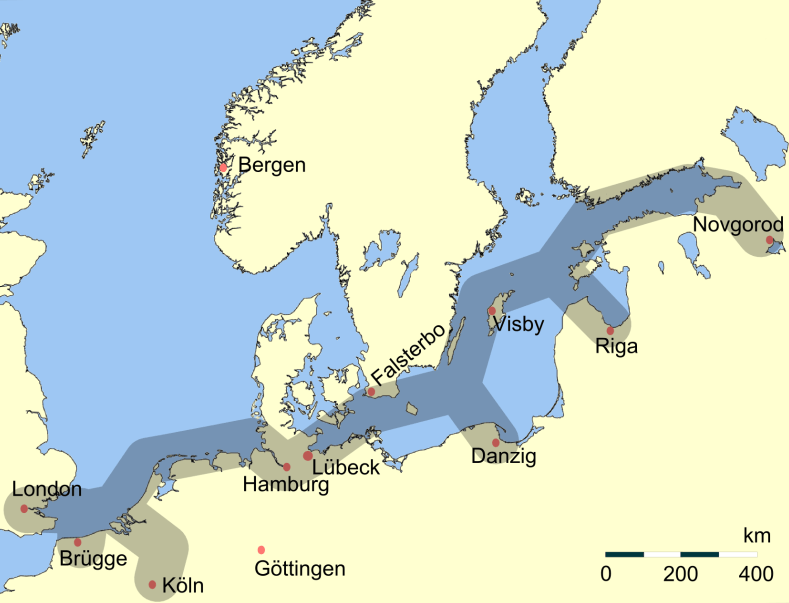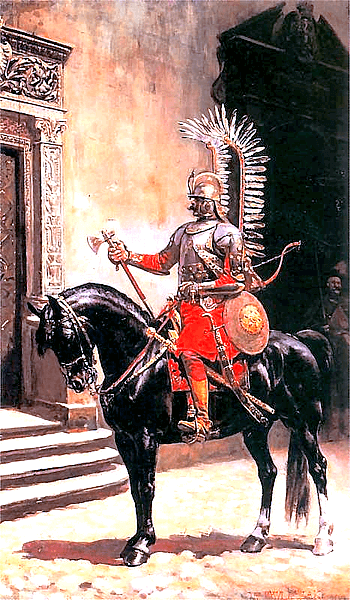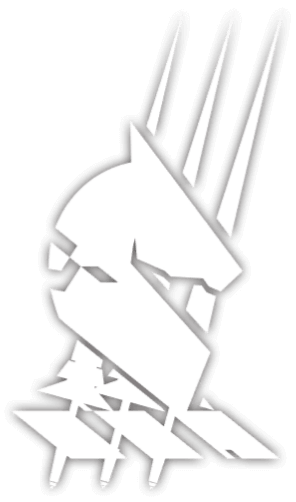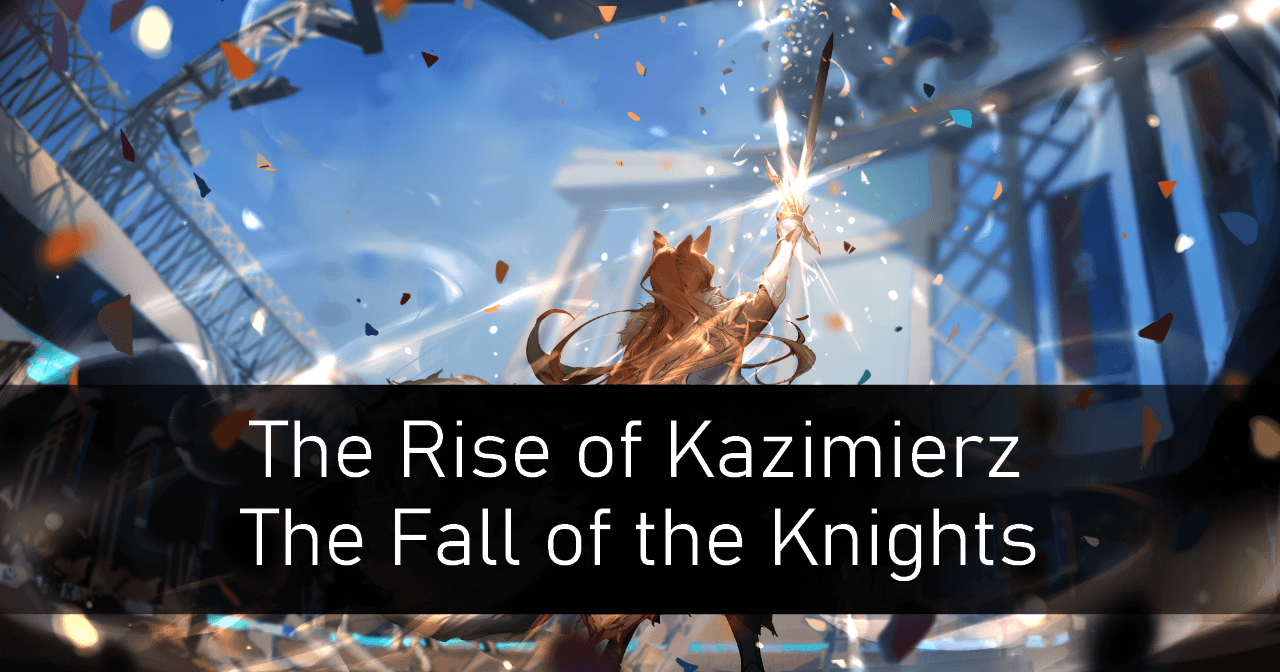We've come a long way since knights in shining armor riding into battle was the fad. However, it's undeniable that they left a lasting impact on us, appearing in books, television, movies, and here in Arknights as well. But just like how knights and chivalry in the real world have largely disappeared outside of HEMA enthusiasts and historical reenactments, the knights in Kazimierz have also faded out of power, reduced to entertainment and propaganda. Let's take a look, then, at how the knights came and went, and the similarities between Kazimierz and our own history.
Chivalry is Dead
The original concept of chivalry has largely disappeared along with feudalism around the 15th century, with some portions of Europe lasting way into the 17th century, replaced by a new economic system we now call capitalism. The process was a slow grind that lasted for over three centuries, and many factors contributed to this change.

Battle of Grunwald, by Jan Matejko
Kazimierz’s commercialization of its ancient class of knights once invited criticism from other countries. But the birth of Kazimierz’s knight sports, as well as the existence of knighthood as a whole, are more complicated than most outsiders realize.
[...] what made this event remarkable was the winning bidder: not a knight representing some proud noble, but rather a subordinate of the deceased nobleman. A single knight-retainer had put forth a huge sum that rendered all the nobles in the room speechless.
From Blemishine's Archive 3, we can determine that the Kazimierz Knights of the old practiced a form of feudalism. They, just like knights in history, were responsible for warfare and thereby are nobles. Judging by how a knight's retainer winning an auction for land was a historical moment, it would mean that prior to this, the exchange of a knight's land was solely between other knights. These knights owned land, property, status, servants, and even slaves. On the other hand, the Knight-Assassins are responsible for hunting down "rogue knights that refused to cooperate with the reigning government.". You can imagine how common of an occurrence this must've been in the past for an organization to be "cultivated by the various forces of Kazimierz during political struggles with rogue knights", and how much authority the knights once had if the only retaliation against them was through assassination.
If the overthrow of Kazimierz’s Elder regime and the establishment of the [Chivalric Order and the] knights as the ruling class is Kazimierz’s first historical turning point [...]

The Republic at the Zenith of Its Power. Golden Liberty. The Royal Election of 1573, by Jan Matejko
If we look at the Polish–Lithuanian Commonwealth, the inspiration for Kazimierz, we'll find something called the "Golden Liberty" (Złota wolność in Polish, thanks to user bgilc who pointed it out in the comments). The system can be summed up with the phrase "Rex regnat et non gubernat"—"The King reigns but does not govern". Instead, most of the power was in the nobles' hands. Nobles participated in the Sejm held by the King once every two years and voted, with any noble being able to veto legislation and required everyone to reach a consensus. In a time where autocracy was prevalent in other parts of Europe, the Golden Liberty was, in a way, like a rudimentary start to democracy. In the end, however, the flaws in the system made the Commonwealth weak, and it was unable to keep up with its neighbouring nations.
As for the knights, they fell out of favour at the end of the middle ages due to the rise of organized infantry that could be trained quickly and cheaply, along with their decreasing effectiveness on the battlefield due to the longbow and later firearms. Feudalism, responsible for funding the knights' training and expensive equipment, was also declining, like a negative feedback loop.
The problems knights on Earth faced don't seem to be an issue for Terra yet, as the Kazimierz Knights can still (somewhat) stand on their own against Ursus and one-man-army type of units like Patriot still exist. We'll have to find another factor for the fall of feudalism then, namely, trading.

Main trading routes of the Hanseatic League, which may have been the inspiration for Wolumonde and its surrounding seven cities
[...] then the upending of their rule by the mercantile-retainers in a practical sense and the formation of Kazimierz’s oligarchical ruling class can undoubtedly be seen as a second turning point.
In the modern era in which countries jockey to establish connections, one can tell from a glance who has the ability to create wealth. In the following decades, the relationship between the merchant class and the retainers became more closely interconnected. The retainers were the ones who could truly create benefit for the country, able to build walls and even move city-states to defend the country.
While the growth of trading after the crusades did a major part in assisting in the downfall of feudalism, feudalism itself restricted trade and economy. The practice tied with feudalism, serfdom, bounded serfs (the poorest class of peasants) to a plot of land owned by their lord. In Poland, for example, serfdom lasted for over 800 years from the 10th to the 18th century. To make matters worse, many lords would try to profit as much as they can off the land during their tenure with no consideration of the long-term consequences. One Count by the name of Jerzy Wandalin Mniszech lost 88 of his 113 households in only a few years this way.
This was good when one person wanted to make a lot of money, but not so good when everyone wanted to make a lot of money. Serfdom and the focus on agriculture made urbanization in the Polish–Lithuanian Commonwealth quite a bit slower relative to other nations at the time. In other parts of Europe, the advancement of trading allowed peasants, who had the means of production, to become less and less dependent on their lord. There is, after all, only so much you can squeeze out of a plot of land through farming. With more and more trading, more people were able to move into cities, breaking apart the nobles' labour force and income.
Due to the volatility between Kazimierz, Ursus, and Leithania, as well as the intrigue among powerful nobles, the knights had to rely on extremely wealthy guards to consolidate their positions and ambitions. After decades of cruel, bloody change, Kazimierz has finally arrived where it is today.
Although the Commonwealth was partitioned before its systems could be reformed, Poland re-established itself after World War 1, and like Kazimierz, in the past few decades it transitioned into a capitalist system.
Tilting at Waves
Maria has a favorite knight novel. In the novel, the protagonist experiences bizarre adventures on the way to completing his quest, and this occupies 95% of the book. At the end of the book, the middle-aged knight, no longer needed by his family, no longer favored by the Knight Order, and no longer burdened by his love affair, decides to leave. In a distant seaside country, he once again finds his home as a knight, charging against the waves again and again until his voice becomes hoarse, and he is eventually consumed by the ocean— this abrupt ending was once lambasted by more conservative readers, and this novel is the subject of many intense discussions within the circles of Kazimierz’s literary critics. Some say the novel is trash, but others consider the ending a completion of the sublimation of chivalry.
Although there isn't a novel like that on Earth, we do have something that's basically the complete opposite of Blemishine's novel—a normal man becoming deluded by what he thought was chivalry, traveling around doing "knightly" acts while humiliating himself and causing trouble for most people he encounters, until finally snapping back to his senses after falling sick, shortly before his death.

Don Quixote de la Mancha
Before Don Quixote was published in 1605, chivalry novels were seeing popularity across Europe, but there were also many who thought the genre was childish and outdated. The novel's author, Miguel de Cervantes, wrote his novel to poke fun at those stories of knights and ladies. As it turned out, the novel was a huge success, often being referred to as the first modern novel for the ideas and literary devices Cervantes introduced.
"Chivalry" originally meant "horsemanship" in Old French. Although what exactly chivalry is hasn't been clearly defined, it essentially is a set of rules knights are expected to follow, with things like "be a decent human being" and "be loyal to your lord and the church" and "don't show your enemies mercy". And even these are products of the Late Middle Ages, where the idea of chivalry was already being romanticized. Knights are, after all, people. Some of them were nice fellows, others less so. It was not uncommon for knights to pillage villages and take women for themselves.

I am not an objector of the Knight Tournament, but the gray powers and trades behind it have destroyed the rebirth of the creed of the ancient knights, and even turned it into a promotion tool and the cover of the fake peace.
Although Kazimierz has pushed back Ursus every time it has tried to invade their border, many civilians there were tired of the warring and could no longer stand the pride and arrogance of the knights.
—Letter from Nearl during Grani and the Knight's Treasure"The Kazimierzian chivalric spirit should have been the force of salvation for all who suffer in this world. But now, it's nothing more than a rotten legacy, used to the advantage of the rich. Nothing can be more shameful than that."
—Nearl's talk after Promotion 2
So while people like Blemishine held on to the honorable aspects of chivalry, the actual culture surrounding the knights was never as pretty as the books described. Even before the knights' fall, they already had problems with "intrigue among the nobles". Now, they are tools for Big Tourney to make more money, discarded if they show the slightest signs of rebellion or when they no longer have any use.
The Winged Hussars
Kazimierz is bordered by the Ursus Empire. The Polish–Lithuanian Commonwealth is bordered by the Russian Empire. These neighbours were on less-than-friendly terms, and war often broke out between the two.
They are pushed to the outskirts of the last city, the last line of defense——
——Where Kazimierz makes its last stand, a pegasus with golden hair appears.
On the dawn of that day, when the Ursus suffer their first defeat of the war, on the faraway horizon of Kazimierz, two suns rise.
If we're going to mention Poland and the Pegasus, then I'll have to bring up the Winged Hussars.

Polish-Lithuanian Hussars, by Wacław Pawliszak
These soldiers with wings on their backs formed the elites of the Polish cavalry and were instrumental to many of the Polish–Lithuanian Commonwealth's successes. One such success was the Battle of Klushino during the Polish–Muscovite War (between the Commonwealth and the Tsardom of Russia/Sweden), where over five thousand Hussars and a few thousand soldiers were pitted against a Russian force more than six times their size and emerged victorious. They are perhaps best known for their "wings", which were made out of wood and feathers of large birds. It has theorized that the rattling of these wings when they ride into battle gives their enemies the illusion that the size of their army is much larger, or they may have been used because they were visually intimidating.
"Were it not for you charging so boldly into the fortress with that shield of yours, Barclay, Semyon, and I would surely have died at the hands of Kazimierz's Silverlance, Pegasus Order of Knighthood."
—Hellagur to Patriot
Kazimierz called their elite the Silverlance Pegasus, and the lance was indeed one of the most important parts of the Winged Hussars. They were made hollow and reinforced, allowing them to extend to over 6 meters, even longer than most pikes. The lances were also attached to the saddle via a pouch. This lessened the burden of the lance's weight, and also allowed the momentum of the horse to transfer to the lance on impact.
Now, even though the Silverlance may only be a shadow of its former glory, Kazimierz still has people dressed as knights. With wings.

... Yeah.
The Winged Hussars, as powerful as they were, were not immune to firearms and artillery. Their enemies formed new tactics targeting the cavalry, such as the use of cheval de frise which were essentially wooden frames with spears and spikes stuck onto them, and when deployed on the battlefield they effectively stopped any horsemen from passing. With these new tricks, the Swedish Empire won against the Winged Hussars despite having a numerical disadvantage during the Battle of Kliszów in 1702. This would be the last major battle that the Winged Hussars fought in.
Left without a purpose and income, the Winged Hussars were forced to take on less militaristic tasks such as participating in ceremonies. They were even derogatively referred to as "funeral soldiers" for their tendencies to appear in funerals. In 1776, they would finally be disbanded by the Polish government.
So much for the Silverlance Pegasus.
Step 4: Profit
“Unreasonable, you say? Everyone who found it unreasonable has been eliminated, creating this thoroughly reasonable history. Fortunately, I’ve accepted this truth. You understand this, don’t you?”
—Spokesman Malkiewicz’s conversation with the Doctor during the Major
In the end, it still comes down to the perspective. We think that the current Kazimierz is greedy and corrupt, but for the people sitting in the audience cheering on, who are able to live like this because of the economy the tournaments brought, this is exactly what they wanted. Honor and chivalry don't put food on the table, after all. And to borrow James Carville's quote again,
"It's the economy, stupid."

Many thanks to the people on the Discord lore channels who helped me with this article.












